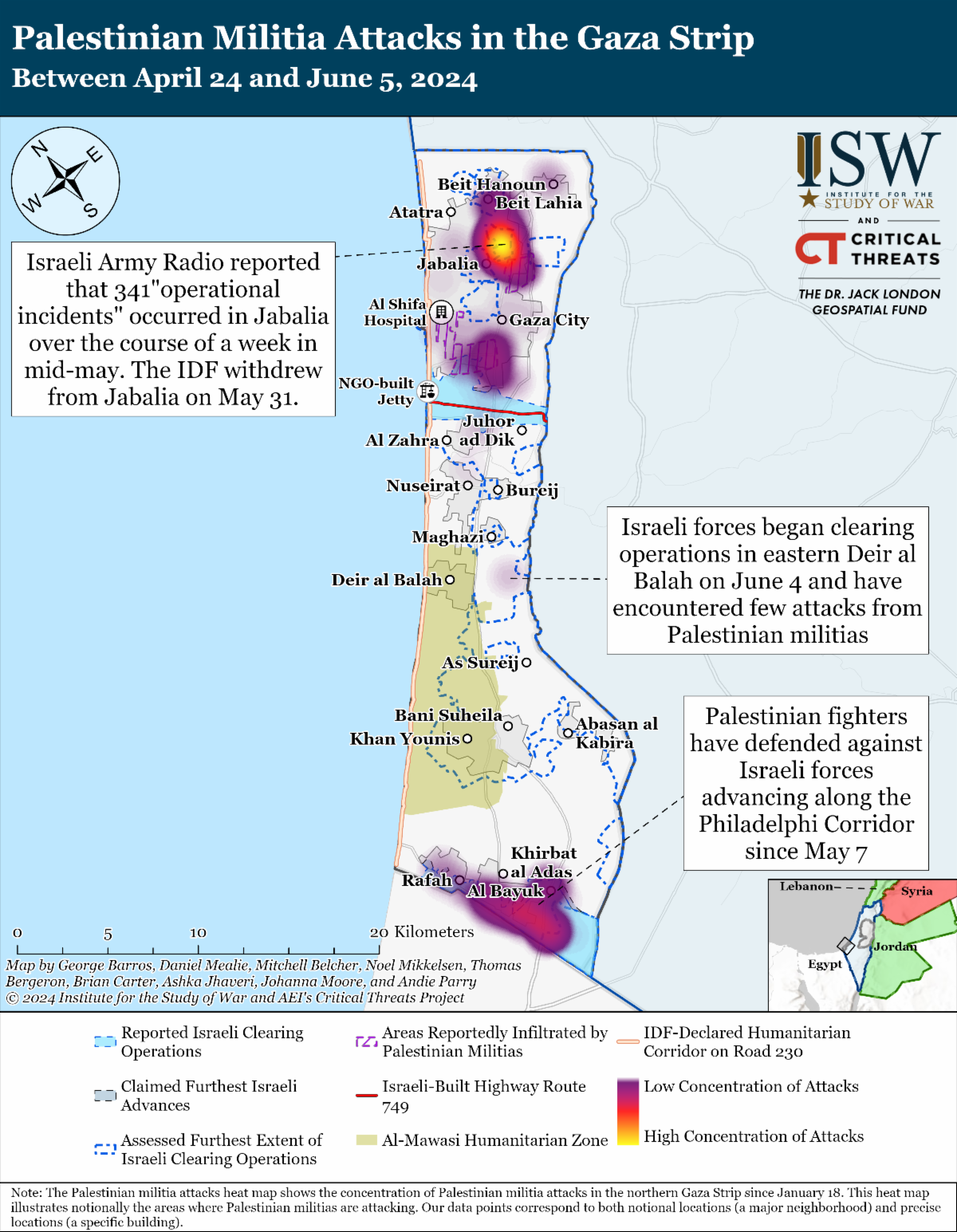Hamas reportedly said that it will reject the Israeli ceasefire proposal, arguing that the proposal does not ensure a permanent end to hostilities. Saudi-based media obtained a copy of a Hamas memo to other Palestinian militias in which Hamas explained that Hamas did not accept the proposal because it is "fundamentally different" from the proposal that US President Joe Biden outlined on May 31. Hamas said that it is committed to the proposal it accepted on May 6. Egypt unilaterally modified the May 6 proposal to include a permanent end to hostilities. Hamas has previously said that it will not accept a ceasefire that does not ensure a permanent ceasefire after the completion of the initial phase of the proposal Hamas does not view any ceasefire as permanent and believes that any truce that ends before Israel’s destruction is a temporary truce. The United States said on June 6 that Hamas has not delivered an official response to the Israeli proposal.
Hamas’ reported rejection follows several reports that negotiations involving Israel, Hamas, and international mediators were showing no signs of a breakthrough. Unspecified Egyptian sources said the mediators were attempting to reassure Hamas that the proposal would lead to an end to the fighting and full Israeli withdrawal from the Gaza Strip.
Hamas will likely continue to reject ceasefire proposals if the proposal fails to secure Hamas’ maximalist objectives, which include a permanent ceasefire. Hamas remains confident that it can survive Israeli military operations in the Gaza Strip, and it can therefore pursue its maximalist demands without major concessions. Hamas’ leader in the Gaza Strip, Yahya Sinwar, said in February that his military forces are in good condition and would survive a Rafah operation and he was in no rush to secure an agreement in early May. CTP-ISW has previously noted that Hamas’ confidence in its survival increased and its ceasefire demands appear to have solidified as the IDF drew down its forces in the Gaza Strip beginning in late December 2023.
Key Takeaways:
- Iranian Presidential Elections: Iranian hardline officials are continuing to try to promote an electoral consensus among hardliners ahead of the June 28 presidential election as part of an effort to avoid infighting between hardliners that could provide an opening for a moderate victory.
- Ceasefire Negotiations: Hamas reportedly said that it will reject the Israeli ceasefire proposal, arguing that the proposal does not ensure a permanent end to hostilities. Hamas will continue to reject proposals until it secures a “permanent ceasefire.” Hamas does not acknowledge the legitimacy of any permanent ceasefire and has repeatedly said that any ceasefire is temporary until Hamas destroys Israel.
- Gaza Strip: An Israeli official said that Hamas is avoiding direct battles with Israeli forces, preferring to ambush the IDF and using improvised explosive devices against Israeli forces.
- Yemen: The Houthis claimed on June 6 that they conducted a combined operation targeting Israel with Iranian-backed Iraqi militias as part of their effort to impose an unofficial blockade. This blockade is unlikely to be successful, given that the Houthis have so far been unable to successfully attack Israeli shipping in the Mediterranean at a sufficient rate to impact imports or exports from Mediterranean ports.
- Iraq: Iranian-backed Iraqi militias reportedly set a 40-day deadline for the Iraqi prime minister to expel US forces from Iraq.
- West Bank: Palestinian fighters are likely maintaining at least one vehicle-borne improvised explosive device (VBIED) manufacturing cell northeast of Tubas. Palestinian militias in Tubas may be collaborating to assemble and deploy these VBIEDs, given the significant amount of resources and expertise required to manufacture a VBIED.
| 






 [ISW] 이스라엘-하마스 전쟁(이란) 업데이트, 2024년 6월 10일
[ISW] 이스라엘-하마스 전쟁(이란) 업데이트, 2024년 6월 10일
 [ISW] 이스라엘-하마스 전쟁(이란) 업데이트, 2024년 6월 2일
[ISW] 이스라엘-하마스 전쟁(이란) 업데이트, 2024년 6월 2일